A Closer Look at Use Cases and Business Impact: PWA vs. Native Apps
Understanding when to utilize Progressive Web Apps (PWAs) and native apps is crucial for businesses seeking to optimize their mobile app presence. In our blog “Decoding the App Dilemma” we learnt that PWAs offer seamless browsing experiences, fast loading times, and offline access while native apps shine in platform-specific functionality, integration with device features, app monetization. By choosing the right app solution based on specific use cases, businesses can enhance user experiences and achieve their goals effectively.
When to Consider Using Progressive Web Apps (PWA)
Content-Based Websites

If your primary focus is delivering content to users, such as news websites, blogs, or informational platforms, a PWA can offer a seamless browsing experience with fast loading times, offline access, and easy discoverability through search engines. With features like offline access, push notifications, and smooth navigation, users can stay engaged with the latest articles, videos, or podcasts, even when they are offline or on low connectivity.
E-commerce Platforms

PWAs can be an excellent choice for e-commerce businesses, providing a mobile-friendly shopping experience with smooth navigation, push notifications, and offline capabilities. Users can easily browse products, add items to their cart, and make purchases without the need for app installations.
Service-Oriented Apps

If your app primarily focuses on providing services or utility to users, such as booking systems, reservation platforms, or productivity tools, a PWA can offer a cost-effective solution with cross-platform compatibility, quick updates, and easy accessibility through web browsers.
Informational Directories

If your app serves as a directory or listing platform, such as business directories, restaurant finders, or travel guides, a PWA can provide a responsive and easily accessible solution. Users can quickly search for information, view listings, and interact with the content without the need for app installations.
Rapid Prototyping or MVP Development

If you’re in the early stages of app development and want to test the market or validate your concept, a PWA can be a cost-effective option. It allows you to iterate quickly, gather user feedback, and make necessary adjustments without investing heavily in platform-specific development.
Project Management Tools

A project management tool implemented as a PWA could allow teams to access project information, tasks, and updates, even while offline. It could sync updates once the connection is restored, ensuring the continuity of work without the need for consistent connectivity.
When to Consider Using Native Apps
Performance-Intensive Applications

If your app requires extensive utilization of device-specific features, such as camera functionalities, GPS, augmented reality, or complex animations, a native app allows you to leverage the full potential of the platform, ensuring optimal performance and a highly tailored user experience.
Gaming and Interactive Apps

For applications that demand high-quality graphics, complex gameplay, and real-time interactions, native apps are often preferred. The native development approach allows for seamless integration with gaming engines, hardware acceleration, and access to native APIs, resulting in immersive and engaging user experiences.
Platform-Specific Functionality

If your app heavily relies on specific features or integrations available only on a particular platform, such as Apple Pay on iOS or Google Maps on Android, developing a native app ensures seamless integration and maximum utilization of platform-specific functionalities.
High-Performance Multimedia Applications

If your app focuses on delivering high-quality multimedia content, such as video streaming services, music apps, or graphic-intensive applications, native apps provide superior performance and can take advantage of hardware acceleration and native multimedia APIs.
Location-Based Services

If your app heavily relies on geolocation, mapping, or navigation features, such as ride-hailing services, delivery apps, or travel planners, a native app can offer seamless integration with the device’s GPS capabilities, providing accurate and real-time location-based functionalities.
Offline Data Management

For apps that require extensive offline data synchronization or local storage, native apps provide more robust options. They can efficiently manage offline data caching, local databases, and data synchronization with backend systems, ensuring a seamless user experience even in areas with limited connectivity.
In Sum
Whether you are a startup, small scale business or a large enterprise, at Goodmans Vision, we are your trusted partner, offering expert consultation to help you make informed decisions based on your specific project requirements. With our specialization in web development, mobile app development, and a wide range of other services across industries, we provide comprehensive solutions that enable seamless user experiences, enhance business efficiency, and drive growth. Get in touch with us to unlock the full potential of your digital strategy and stay ahead in the competitive landscape.




